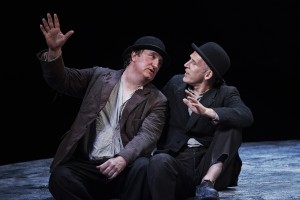After Sixty Years Fresh as Ever: Waiting for Godot at Boston’s Arts Emerson

Photo by Ros Kavanag.
Samuel Beckett’s Waiting for Godot premiered sixty years ago as En attendant Godot in a small, run-down theater in Paris. Despite the play’s lack of traditional structure – exposition, story development, action, climax, and dénouement – opening night reviews were enthusiastic and the production ran for a hundred performances. Beckett translated and adapted it into English, Irish English at that, as a hearing of the excellent Gare St Lazare Ireland and Dublin Theatre Festival co-production at Boston’s Paramount Theatre demonstrates.
The two tramps who wait endlessly still fascinate. Loneliness, craving meaning in a meaningless world, savagery, longing for ways to make time pass faster remain part of the human condition. Director Judy Hegarty Lovett’s version is less vaudevillian than is often the case. Although Vladimir (Conor Lovett) and Estragon (Gary Lydon) wear the hats of English music hall and go by the clown nicknames, Didi and Gogo, given them by Beckett, there is a realistic element to their acting that is very moving.
They play off each other with great skill, move well, have a keen sense of timing, and speak the playwright’s lines beautifully. Their accents bring out hidden cadences of Beckett’s language, while making us aware of how deeply Irish the play is. Suddenly, the specificity of locality comes alive. When Gogo complains, “all my lousy life, I’ve crawled about in the mud,” the allusion to Ireland seems obvious. Gogo’s line, “calm … calm … the English say cawm” takes on new meaning in Gary Lydon’s brogue. Lovett and Lydon’s accents add a wonderful rhythm to their banter.
Both Lovett and Lydon create distinct characters. Ironically, Lovett’s Didi, small and slender, is more dominant than Lydon’s husky Gogo. Didi, the intellectual, is more talkative. He probes, questions, demands. At times, he plays out to the audience, drawing them into his thoughts and arguments. Gogo is more concerned with creature comforts. At the opening he is a picture of desolation, sitting on the ground, feet in a hole, head in hand, the boot he painfully pulled off beside him. The two men pass their time entertaining themselves by verbally abusing each other. They constantly argue and make up; they separate and come back together – to wait for Godot.
But, though the play revolves around them, they are not the only characters. Midway through Act I and again in Act II, a second pair, Pozzo (Gavan O’Herlihy) and his slave Lucky (Tadhg Murphy) appear and reveal another aspect of life’s misery – cruelty. The sadistic Pozzo drives the overburdened, exhausted, and leashed Lucky with a whip, bidding him do trivial tasks as he jerks the slave about on his rope. During their time onstage, Pozzo and Lucky take precedence and the tramps become their audience.
O’Herlihy, a player of large presence and stentorian voice, performs Pozzo with an American accent, an interesting, if confusing choice. Is it a comment on Pozzo’s otherness or is it meant to have a political implication? Despite Beckett’s famously meticulous stage directions, Lucky’s particular walk is left to the actor and director. Tadhg Murphy, a talented mover, obeys Pozzo’s commands with a stylized rushed mincing walk strangely, but effectively, at odds with his bent, submissive body.
In Ferdia Murphy’s setting, Beckett’s tree is a single long branch hanging over a gray raked circular platform, which epitomizes the dreary, repetitive lives of Didi and Gogo that never reach a destination. The director emphasizes the metaphor periodically when she has the two characters walk round it. At the end of each act, the lights on the actors slowly dim and an image of a cratered moon appears that mirrors Didi and Gogo’s barren world. Murphy dresses the characters in cheap black suits, tieless shirts, and derbies representative of no particular era. The most salient feature of the costumes is Lucky’s leash, a thick and dehumanizing noose tied to the back of his neck with a large knot.
Judith Hegarty Lovett, who has staged more than seventeen Beckett productions, is faithful to the author’s directorial notes. At the same time, she and her cast bring a freshness and vivid life to the work. I cannot recall any other performance of Waiting for Godot where I paid such deep attention to the words.
Oct. 31-Nov.10 at the Paramount Theatre Mainstage, Boston, MA
Directed by Judy Hegarty Lovettt
Cast
Vladimir – Conor Lovett
Estragon – Gary Lydon
Lucky – Tadhg Murphy
Pozzo – Gavan O’Herlihy
Boy – Connor Thomas Upton
Set and Costume Design – Ferdia Murphy
Lighting Design – Sinéad McKenna